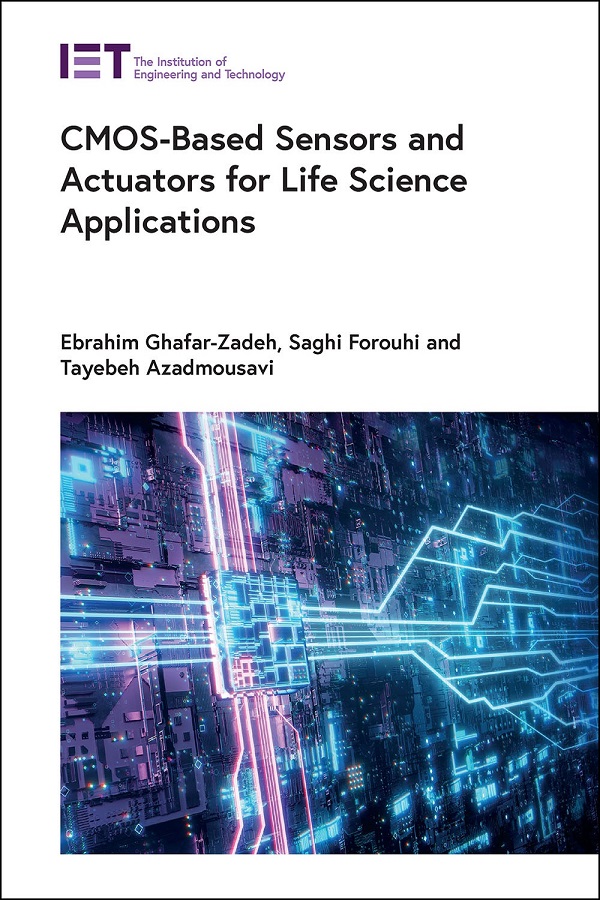- Agricultural Engineering and Technology
- Applied Physics
- Built Environment
- Computing and Networks
- Control, Robotics and Sensors
- Electrical Regulations
- Electromagnetics and Radar
- Energy Engineering
- Healthcare Technologies
- History and Management of Technology
- IET Codes and Guidance
- Manufacturing
- Materials, Circuits and Devices
- Model Forms
- Security
- Telecommunications
- Transportation

CMOS-Based Sensors and Actuators for Life Science Applications
by Ebrahim Ghafar-Zadeh, Saghi Forouhi, Tayebeh Azadmousavi
Emerging complementary metal-oxide semiconductor (CMOS) technologies and their ongoing downscaling trend have opened an avenue to developing integrated systems for life sciences. They offer great advantages for the monolithic integration of several active elements, and the implementation of millions of biosensors along with their transducers and readout circuits on a single chip. Benefits include the ability to make highly dense systems with high signal-to-noise ratios (SNRs), good accessibility and reliability. Moreover, the huge investment in CMOS foundries and the possibility of the batch production of various devices using CMOS have established it as an economical technology appropriate for the fabrication of affordable platforms for end-users. All these features make CMOS electronics a valuable technology for the implementation of integrated bio-systems such as lab-on-chips (LoCs) and point-of-care (PoC) devices.
This book offers deep multidisciplinary knowledge of different types of biosensors and bioactuators. The book covers the design and implementation of CMOS chips, including transducers, readouts and data equation circuitries. It also deals with microfluidic packaging techniques, and biological applications and protocols. The theoretical and practical aspects of CMOS biosensors are discussed, and the fundamentals of microfabrication. Several key life science applications are explored, including optical biosensors, thermal sensors, and a range of actuators.
CMOS-Based Sensors and Actuators for Life Science Applications offers a systematic and thorough approach to this complex multidisciplinary topic for researchers and engineers working in the field of microelectronic design and development, particularly those whose work has life sciences applications.
About the Author
Ebrahim Ghafar-Zadeh received his B.Sc. and M.Sc. in Electrical Engineering from the KNT University of Technology (Tehran, Iran) and the University of Tehran (Tehran, Iran), respectively. He then continued his studies in the Polytechnique of Montreal (Montreal, Canada), where he received his Ph.D. degree in Electrical Engineering in 2008. His graduate studies focused on complementary metal-oxide semiconductor (CMOS)-based sensors for lab-on-chip applications. In recognition of his research achievements, he received several fellowship awards including a Postdoctoral Fellowship (PDF) from the Natural Sciences and Engineering Research Council of Canada (NSERC). Then he continued his PDF research studies in Electrical Engineering at McGill University (Montreal, Canada) and in Bioengineering, at the University of California, Berkeley. As Assistant Professor, in 2013, Ebrahim joined the Department of Electrical Engineering and Computer Science (EECS) in the Lassonde School of Engineering at York University where currently he is an Associate Professor, Member of Graduate Programs of the Departments of EECS and Biology, and Director of Biologically Inspired Sensors and Actuators (BioSA) research laboratory. His research is aimed at exploring novel integrated sensors and actuators for life science applications. He is a Senior Member of the IEEE and a licensed Professional Engineer in the province of Ontario.
Saghi Forouhi is a postdoctoral researcher at York University (Department of Electrical Engineering and Computer Science (EECS), Biologically Inspired Sensors and Actuators (BioSA) Laboratory), Canada. She received her B.Sc. and M.Sc. degrees in electrical engineering from Guilan University, Iran, in 2010 and 2012, respectively. Then, she completed her Ph.D. at Isfahan University of Technology (IUT) in 2019 in an active collaboration between IUT and York University. Her research interests lie in the area of biologically inspired micro-systems, CMOS sensors, circuits, and systems.
Tayebeh Azadmousavi earned both her B.Sc. and M.Sc. degrees in electronic engineering from Urmia University, located in Urmia, Iran, in 2011 and 2013 respectively. She later achieved her Ph.D. degree in electronic engineering from Sahand University of Technology in Sahand New Town, Tabriz, Iran, in 2019. During her academic journey, Dr. Azadmousavi's exceptional accomplishments stood out. She was notably recognized as a distinguished Ph.D. researcher by the Faculty of Electrical Engineering at Sahand University of Technology in 2019. Additionally, she secured the distinction of being the top Ph.D. graduate from Iran's National Elites Foundation in the same year. Currently serving as an Assistant Professor at the University of Bonab in Bonab, Iran. Dr. Azadmousavi has also taken on the role of a Research Visiting Professor at the Biologically Inspired Sensors and Actuators Laboratory (BioSA), situated within the esteemed Lassonde School of Engineering at York University in Toronto, ON, Canada. Her research pursuits encompass a diverse array of topics, including low voltage/low power analog and digital integrated circuits, analog integrated circuits operating in current mode and voltage mode, wireless RFIC design, as well as the innovative field of biosensors.
Publication Year: 2023
Pages: 610
ISBN-13: 978-1-83953-673-1
Format: HBK
